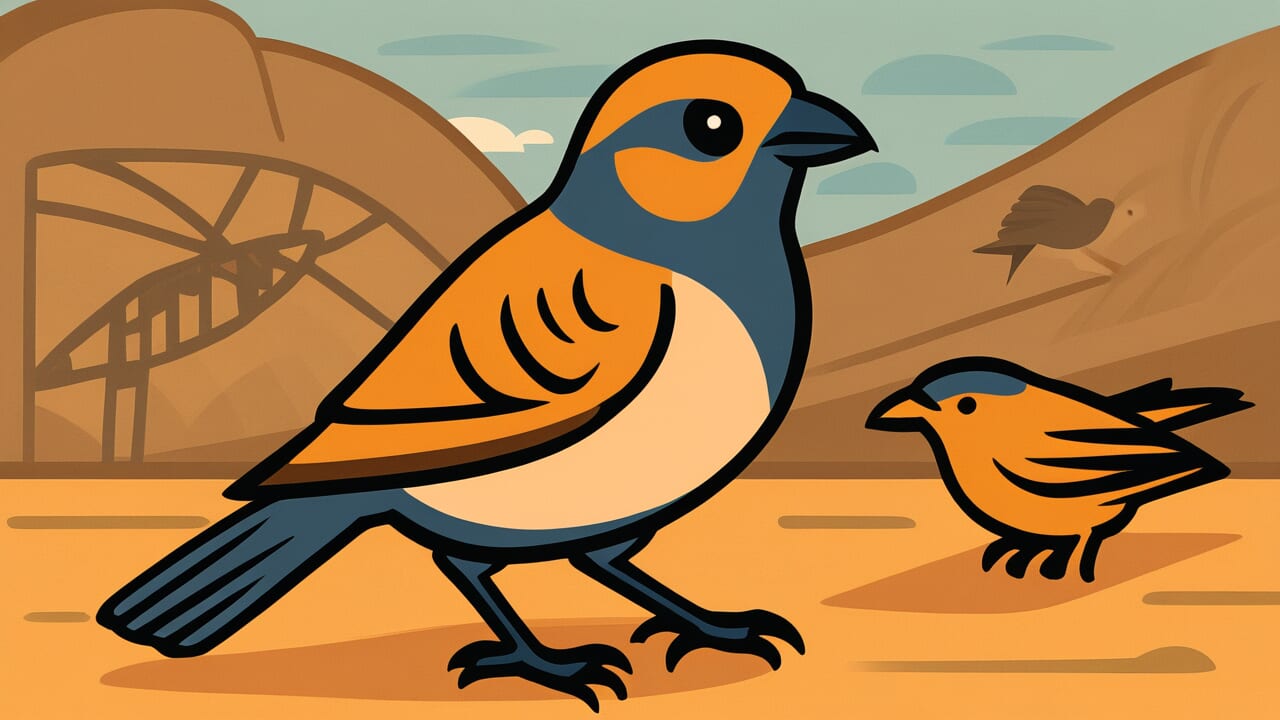How to Read “A sparrow before a hawk”
Taka no mae no suzume
Meaning of “A sparrow before a hawk”
“A sparrow before a hawk” is a proverb that describes how the weak tremble and freeze in fear before the strong, unable to move.
This proverb is used when someone in a weaker position shrinks before an opponent with overwhelming power.
It describes situations with clear power differences, like boss and employee, senior and junior, or strong team versus underdog.
The weaker side becomes frozen and cannot show their true abilities.
This expression emphasizes more than just “being scared.”
It highlights an overwhelming power gap where instinctive fear stops all thought and action.
Just as a sparrow cannot even flee but only trembles before a hawk, humans can lose rational judgment before absolute power.
Today, it still describes the psychological state of shrinking before authority figures or powerful people.
Origin and Etymology
No clear written records document this proverb’s origin, but we can make interesting observations from its components.
Hawks have long been recognized in Japan as the apex of birds of prey.
During the samurai era, falconry was a symbolic pastime of the powerful, making hawks synonymous with strength.
Meanwhile, sparrows were familiar small birds symbolizing weakness and helplessness.
This proverb likely overlays the predator-prey relationship from nature’s food chain onto human social power dynamics.
In actual nature, sparrows make warning calls when they spot a hawk, then hide and freeze.
This instinctive fear response must have seemed to mirror how the weak feel before the strong.
Japanese people have long held a culture of seeing human society reflected in nature.
Observing animal behavior and reading the essence of human relationships from it created many proverbs.
“A sparrow before a hawk” is one such expression born from this keen observation.
The proverb’s clarity comes from expressing psychology in situations with obvious power gaps through two familiar birds.
Interesting Facts
The size difference between hawks and sparrows is greater than you might imagine.
A goshawk weighs about one kilogram, while a sparrow weighs only about 20 grams.
That’s a 50-fold weight difference.
For humans, this would be like a 60-kilogram person facing a 3-ton creature.
This overwhelming gap strengthens the proverb’s persuasive power.
In actual ecological observation, sparrows change their call when they see a hawk.
They switch from the usual “chun chun” to a warning “jijiji” sound.
This vocal change is a danger signal to companions, leading the entire flock to hide simultaneously.
Our ancestors brilliantly put human social power relationships into words through such natural observations.
Usage Examples
- The new employee shrank like a sparrow before a hawk in front of the strict president
- The underdog team started the match in a sparrow before a hawk state facing the champions
Universal Wisdom
The proverb “A sparrow before a hawk” reflects psychological domination created by power differences, a fundamental structure in human society.
Why do people shrink before overwhelming strength?
It’s a response deeply rooted in survival instinct.
Since ancient times, humans have instantly judged whether to fight or flee when facing something more powerful.
But when both seem impossible, living things show a third response: “freezing.”
This is an instinctive strategy to avoid wasting energy on futile resistance and not stimulate the opponent’s desire to attack.
This proverb has been passed down because it describes a feeling everyone experiences at least once.
This happens in social structures where power and ability differences clearly exist.
Somewhere in life, we all experience moments of being the “sparrow.”
Before a boss, a senior, or someone with overwhelming talent, we lose words and cannot show our true selves.
But simultaneously, this proverb poses a question to observers.
When you’re in the “hawk” position, aren’t you making others that frightened?
Hidden here is another universal lesson: the responsibility of those with power and consideration for those in weaker positions.
When AI Hears This
When a sparrow cannot move before a hawk, it’s not “playing dead” but a more primitive reaction.
This is called tonic immobility, where the amygdala in the brain detects danger and stiffens the body without going through thought.
Response speed is less than 0.2 seconds, far faster than conscious judgment.
Interestingly, this response isn’t always the optimal choice.
Even when fleeing would improve survival rates, the body automatically freezes when fear exceeds a certain level.
Research shows that when predators are too close, about 70 percent of small animals choose freezing over escape.
The sparrow isn’t deciding “it’s better not to move” but literally cannot move from fear.
Humans have the same neural circuits.
Going blank in interviews or tests, being unable to move during accidents—these all come from a defense system inherited from hundreds of millions of years ago.
Shrinking before authority figures is also not a matter of reason but the result of the brain automatically recognizing a “higher-ranking predator.”
This proverb verbalized the biological fact that fear transcends reason, long before science explained it.
Lessons for Today
This proverb teaches modern people wisdom for understanding the psychological effects of power differences and responding appropriately from both positions.
When you’re in the “sparrow” position, you don’t need to blame yourself for shrinking.
It’s a natural physiological response.
What matters is recognizing that state, taking deep breaths, and gradually regaining composure.
Don’t demand perfection—responding honestly within your ability is enough.
On the other hand, when you’re in the “hawk” position, the proverb’s true value is tested.
Use your imagination to understand how much pressure your presence puts on others.
Develop the habit of reflecting on whether you’re unintentionally making others shrink.
In modern society, positions are constantly fluid.
You might be a boss at work but in a weaker position before your spouse at home.
Everyone sometimes becomes the sparrow and sometimes the hawk.
That’s why, having experienced both positions, we should have the kindness to empathize with others’ feelings.
Having power also means having the responsibility to restrain it.



Comments